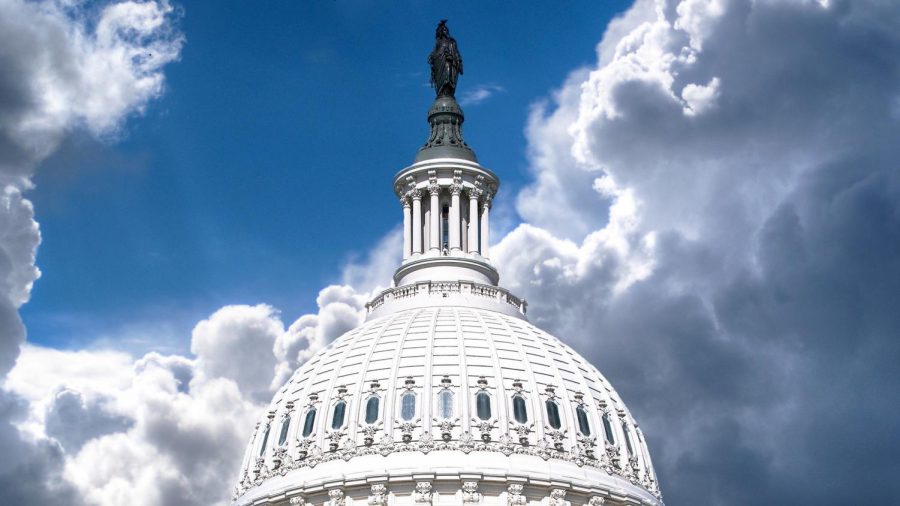After more than a month of protests, riots, virus outbreaks and economic tribulation, Congress has finally returned to session on Sept. 8. And after a month of recess, Americans have begun to ask why their representatives were not working on solutions?
Congressional recesses are a time for representatives to rest and campaign, often scheduled a year in advance and only cancelled when called into a special session by the president. Representatives across the nation spent this recess campaigning or meeting with their constituents grappling with one crisis after another. The two senators from Iowa, R. Chuck Grassley and R. Joni Ernst, spent their recess across all 99 Iowa counties, campaigning and addressing their constituents’ concerns.
And there are a lot of concerns to address. From the public health and economic crises created by the COVID-19 pandemic to the intensified national discourse on race and police brutality, Americans are looking to their leaders to pass solutions. Despite these issues, Congress went to recess without legislative responses to these concerns.
Although Congress addressed the COVID-19 pandemic earlier in the year, the situation has changed dramatically.
The CARES Act, passed in March, provided $2.2 trillion dollars of economic relief to companies and individuals. That money has been used, but the pandemic has not ended. The economy, especially small businesses, is in need of economic support now as much as they were back in March. Many individuals who lost their jobs due to the pandemic are still unemployed as their employers cut back on staff and capacity in order to comply with CDC guidelines.
Even businesses in the Quad Cities are in need of this support. “Our business did receive a Paycheck Protection Plan loan, which helped us with payroll throughout the shutdown,” said Bill Sheeder, co-owner of Baked Bread & Co in Downtown Davenport, on how the virus has affected his own restaurant. “It helped, but ran out. If there were more federal stimulus we would want to use it. Having restrictions and being choked of your full potential means businesses definitely need some sort of assistance to get through this.”
While small businesses and Americans all across the country struggle, Congress went into recess without a deal to get money to Americans. A CARES Act 2 was proposed in the Senate, but partisan debates shut the deal down before it could bring relief to Americans. So, instead of staying in session and coming to a compromise, Congress left for a 2 month recess on Aug. 7.
House Speaker Nancy Pelosi told CNN she would delay or cancel the August recess, but no such action was ever taken. Senate Majority Leader Mitch McConnell adjourned the Senate to recess, but did put senators on a 24 hour notice to return if a bill were to be reached.
Politicians have been quick to claim progress: “I have been advocating for a number of important provisions to be a part of the Phase 4 package,” Senator Ernst said in regards to the next round of economic stimulus, “including rewarding our essential workers with a tax holiday, providing assistance to our nonprofits, investing in broadband and supporting our frontline hospitals and health care providers as they continue to fight the spread of this virus and provide care for our communities and loved ones.”
While representatives tell their constituents that they are working towards a deal, they are traveling for reelection and are not in Washington actively passing this legislation. It does not matter how good the stimulus is until it is passed.
So Congress, on both sides of the aisle, refused to compromise and left millions of Americans desperate for federal support. For one month, American leaders were willing to gamble with American lives.
This is not to say that the Congressional Recess is unimportant. Since the beginning of this country, the Congressional Recess has been a chance for representatives to hear the concerns of their constituents and have a break from their busy legislative sessions.
The two senators from Iowa made good use of their recess, visiting all 99 of Iowa’s counties to campaign and listen to their constituent’s concerns.
“Senator Ernst toured derecho damaged areas, met with economic development leaders and also supported the BUILD (Better Utilizing Investments to Leverage Development) grant application that Clinton County and the city of LeClaire have submitted to improve infrastructure that supports economic growth in our communities,” State Senator Chris Cournoyer said. “It is great that they take time to visit each of the 99 counties during their recesses from Congress to visit with people from around the state that have unique situations and stories to share.”
Although, not every representative used this time effectively. Many politicians have been caught breaking their own guidelines, such as the Speaker of the House Nancy Pelosi, who had her hair done at a San Francisco salon while it was closed to other patrons.
So our representatives are breaking their own guidelines and bickering over a deal while Americans wait for help. It does not matter whether they were listening to constituent’s concerns or getting ice cream, they were not working on desperately needed legislation. There should not be a recess in a time of crisis.
And so, each American citizen has to ask themselves a question this November: Are our politicians doing their job?
Every representative will blame the other party for the congressional deadlock, every politician will claim progress and they will ask for your vote. But voters have a duty to keep their representatives in check.
With the election just around the corner, look at your representatives and really ask if they are working towards their jobs. Did they support reasonable bipartisan bills? Did they stick to their morals rather than fall in party lines? Did they work for their constituents or themselves?
As Congress members up for reelection, they will know that their August recess is in the back of every voter’s mind as they head to polls.









